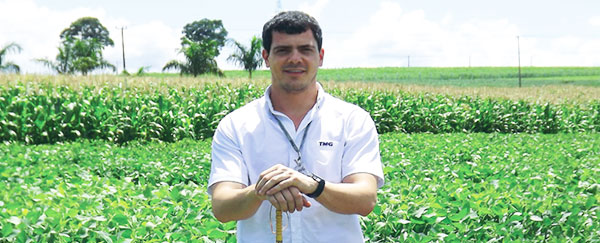Tropical Melhoramento & Genetica, or TMG, is a leading plant-breeding company in Brazil that focuses on two of the country’s biggest crops, soybeans and cotton.
“We deliver to the market seeds that have higher yields and resistance to most of the diseases found here,” says Alexandre Garcia, TMG’s research supervisor.
It’s challenging work. Take soybeans, for example. There are nearly 50 diseases that can affect these protein-rich legumes. Yet TMG is helping growers increase their yields about 3 to 5 percent each year.
Increasing Throughput, Decreasing Costs
“A sector of the company is dedicated to the discovery and use of molecular markers in the breeding process,” Garcia says. “Basically, we discover markers linked to phenotypic traits of interest and try to incorporate these markers into our routine screenings. Once a marker is validated, we start to select plants based on the DNA pattern.”
He notes that these molecular markers are also used in Quality Control to ensure the purity and uniformity of seed lots produced by the selected plants.
“As a commercial breeding company, we had the need to increase throughput and reduce costs by scaling down our reaction volumes—all without losing the precision,” Garcia says.
He and his team were able to do both with a combination of technologies from Agilent: The BioCel 1800 integrated with the Bravo Automated Liquid Handling Platform.
 Alexandre Garcia, Research Supervisor, Tropical Melhoramento & Genetica (TMG) in Brazil
Alexandre Garcia, Research Supervisor, Tropical Melhoramento & Genetica (TMG) in Brazil
Speed, Consistency, and Low Maintenance
“The system is fast, precise, robust, and very easy to operate. I was impressed with the Bravo from the very first day. We took it out of the box, and in 15 minutes it was already running,” Garcia recalls.
“Prior to installing the Bravo, we did all the DNA extractions and PCR set ups by hand. This was a very low throughput process with a very high chance of errors, especially during transfers from one plate to another.
“For our applications, throughput easily increased tenfold without any major modifications in our lab or personnel. Plus, the costs of our process decreased because we could reduce all the reaction volumes using the automated pipettors.”
Garcia was also impressed with the speed, consistency, and low maintenance of the Bravo platform—“and it has the flexibility of doing anything from one well to an entire plate,” he says.
He also had high praise for Agilent’s BioCel system, calling it a game-changing technology. “We can configure it to run everything we do in the lab: DNA extraction, PCR set up, ELISA reactions … The options are limitless,” he says. “Now our people can focus their attention on the research and data analysis.”
The bottom line: “We have much more confidence in our process,” Garcia says. “The chance of errors by sample changes or cross contamination was reduced to zero, and the coefficient of variation on the pipetting was reduced to very low levels.”
To learn more about the Agilent Bravo Platform and how other researchers use it, visit www.agilent.com/lifesciences/Bravo
For Research Use Only. Not for use in diagnostic procedures. Information, descriptions and specifications in this publication are subject to change without notice.
© Agilent Technologies, Inc. 2014 Published in USA, September 15, 2014 5991-5146EN







